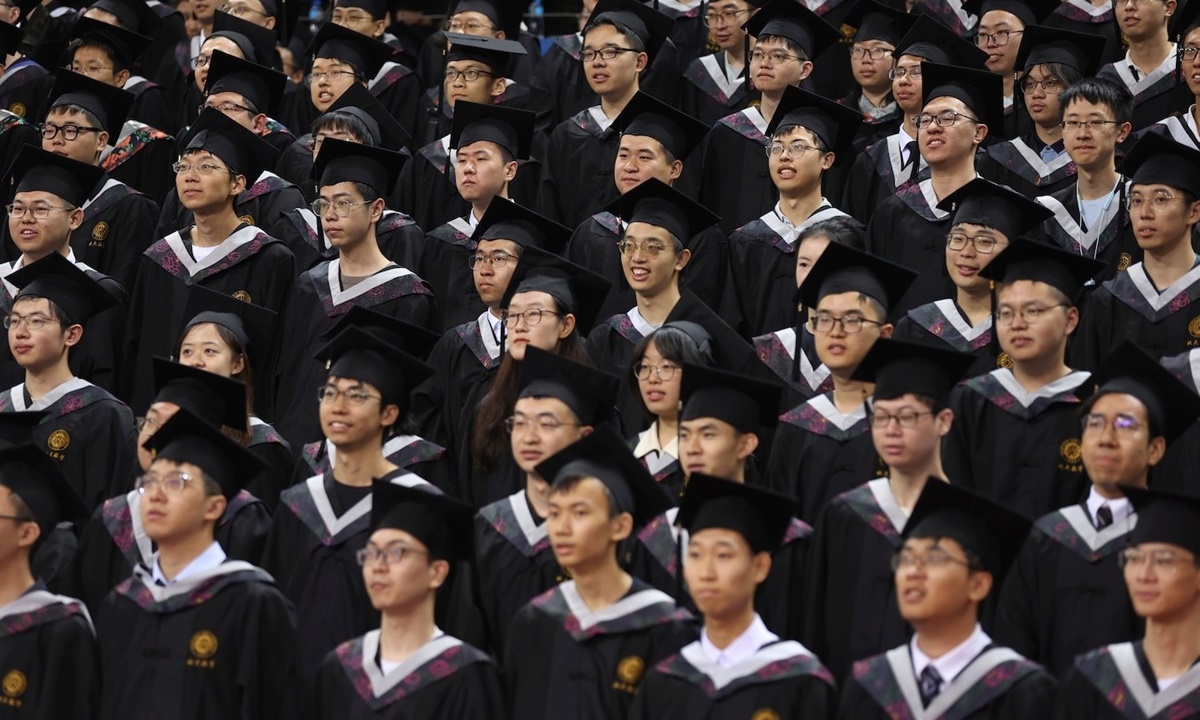As a student at Peking University, one of China's most prestigious institutions, Crystal always envisioned working for a top technology or finance corporation.
Throughout her undergraduate years, she strived to improve her employment prospects. Crystal participated in case study competitions hosted by international companies, hoping to showcase her adaptability beyond her social sciences and humanities bachelor's degree.
 |
Students attend a graduation ceremony at Peking University on 2/7. Photo: AP |
She also completed 4 internships at tech companies, including ByteDance, TikTok's parent company. Upon graduating in 2023, Crystal ranked in the top 10% of her class.
Despite her impressive credentials, Crystal faced a single post-graduation option: pursuing a two-year master's degree in economics and management before entering the workforce.
"There's no guarantee of employment after graduating from university," Crystal said. "The economic outlook was bleak when we graduated. Peking University's class of 2014 could find decent jobs and live comfortably after graduation, but we can't."
Crystal's situation reflects the challenges faced by recent graduates, even high-achievers from renowned Chinese universities, in their job search.
Nancy Qian, an economics professor at Northwestern University's Kellogg School of Management, explained that graduates from top Chinese universities not only struggle to find high-paying jobs, but also "have to compete fiercely for mediocre-paying jobs that wouldn't allow them to live independently."
Since the Covid-19 pandemic stalled China's economy, new graduates have encountered a difficult job market marked by layoffs and downsizing.
Experts say that with a growing number of graduates and fewer job openings, high-paying companies have shifted to primarily hiring candidates with master's degrees.
Graduates from leading Chinese universities have long pursued postgraduate studies. About 80% of Peking University graduates each year opt for further education. However, instead of pursuing master's degrees to secure higher salaries, students now pursue postgraduate degrees simply to find employment, Qian noted.
Even a master's degree may not be enough. A 2023 report from Zhaopin, one of China's largest online recruitment platforms, stated that many mistakenly believe a master's degree is a "golden ticket" to employment. In reality, it's merely an entry pass.
"Securing a good job still depends on your abilities. Educational qualifications are just the minimum requirement for job seekers, not an advantage," the report emphasized.
Furthermore, a growing number of Chinese students are choosing domestic postgraduate programs over studying abroad. At Tsinghua University in Beijing, consistently ranked the nation's best, 54% of 2013 graduates chose domestic postgraduate studies. By 2022, this figure rose to 66%.
At Peking University, 48% of the 2019 graduating class enrolled in master's or doctoral programs in China. For the 2024 class, the rate was 66%.
Dong Jiachen, a recent sociology master's graduate from Peking University, said students now believe that "if employers' requirements keep increasing, you have to meet them. So, getting a postgraduate degree has become a necessity."
Like Crystal, Dong aimed for the private sector, recognizing that a master's degree was just the beginning.
"Even before starting your job search, you need to complete multiple internships, obtain relevant certifications, practice employer-issued written tests, and much more," said Dong, who completed 6 internships before securing a full-time position at Meituan, one of China's most popular online shopping and delivery platforms.
According to Professor Qian, "what's truly surprising about this job market downturn is that it's affecting the educated elite, who were considered the most secure."
Qian said many graduates who worked hard to enter prestigious universities now feel demoralized. "Many are asking, 'What was all that for? Why did we work so hard? Maybe we should just give up.'"
Lily Liu, the former CEO of a Chinese online recruitment platform with around 100,000 users, said job seekers are now more demanding of their workplaces.
"New graduates' expectations are diverse, encompassing company culture, industry values, salary, and commute distance. If these expectations aren't met, they'll quit and return to school," she said.
Qi Mingyao, founder and CEO of Ruihua, a Beijing-based telecommunications company, called it a "credential inflation" problem in China.
"When I entered university in 1992, 100% of graduates found jobs, and good ones at that. Now, master's graduates are like yesterday's bachelor's graduates, and bachelor's graduates are like vocational school students."
According to Qi, Ruihua has downsized from about 60 employees before the Covid-19 pandemic to about 20 currently and hasn't hired in the past few years due to the difficult economic climate. If the company starts hiring again, Qi said he would also look for candidates with master's degrees.
"We want to develop our software, and those with postgraduate degrees bring higher specialized skills than bachelor's graduates," he said.
Experts warn the job market downturn could have cascading demographic consequences for China.
Qian said young people "won't think they have enough money to get married and start families." "When you have high youth unemployment, all the usual ways people meet, socialize, get married, and have children are disrupted," she noted.
The job outlook for new graduates shows no sign of improvement, especially with increasing tensions between China and the US under the Trump administration.
"Due to US tariffs, foreign companies are hiring fewer people in China," Liu said.
After completing her master's degree this spring, Crystal will start working at a leading tech company in Beijing.
"Compared to Americans or Europeans, of course I'm not happy. How can they take 30 days off and still earn so much?" she said. "But compared to previous generations, I don't think I work that hard. My parents' generation also worked long hours, but they didn't eat well or dress well. Thinking that way, I feel it's our turn to bear the burdens of our generation."
Vu Hoang (According to Washington Post, AFP, Reuters)












